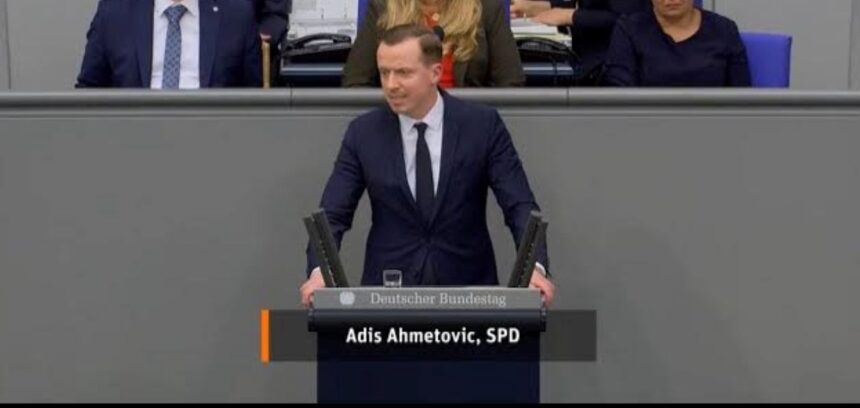German Bundestag Member Adis Ahmetović (SPD) has spoken to DW about the lack of attention given to Albanians in Southern Serbia, the commemoration of the Srebrenica genocide, and his strong support for Kosovo’s European integration process.
Srebrenica: A Necessary Debate and Lasting Responsibility
Ahmetović, personally affected by the Bosnian War with his grandfather’s remains identified from a mass grave in 2016, expressed gratitude for the Bundestag’s consensual debate on the 30th anniversary of the Srebrenica genocide and the first-ever International Day of Remembrance for the crime.
“This debate was necessary,” Ahmetović stated. “Even after 30 years, there are still political actors in the Western Balkans – in Bosnia and Herzegovina, but also in Belgrade – who deny the genocide, try to distort history, and glorify war criminals like Ratko Mladić or Radovan Karadžić. This is unacceptable. We have a responsibility – to the victims, their families, and the entire region.”
Kosovo’s Council of Europe Membership: A Priority for Germany
Drawing lessons from Srebrenica, Ahmetović emphasized the need for continuous, close monitoring of the Western Balkans. He asserted that the region is not a periphery but a central part of Europe, with many people from the Balkans now integrated into Germany as citizens.
For Kosovo, he was explicit: “We want this country to become a member of the Council of Europe as soon as possible – if it were up to the SPD, better yesterday than tomorrow.” He regretted that membership wasn’t achieved in the previous legislature despite “strategic momentum,” suggesting more pressure should have been applied.
As the foreign policy spokesperson for the SPD parliamentary group, Ahmetović vowed to do everything to maintain this course. He specifically pointed to the German government’s need to exert more pressure on Council of Europe member states that were opposed to Kosovo’s membership. He also noted that Foreign Minister Wadephul himself has stated Kosovo should become a permanent member of the Council of Europe, a promise the SPD intends to hold him to.
EU and NATO Integration for Regional Stability
Ahmetović stressed that a crucial lesson from Srebrenica is that the integration process for the six non-EU Western Balkan countries must gain serious momentum. For lasting stability and security, these countries, including Kosovo, need a “real, transparent, and honest perspective for membership.” He underscored that NATO membership is equally important as EU membership, as collective security and political integration are closely linked.
He concluded by stating that while he cannot provide a specific timeline for these integrations, he will ensure the perspective becomes real. However, he also emphasized that the Western Balkan states themselves – Kosovo, Bosnia-Herzegovina, Serbia, Montenegro, Albania, and North Macedonia – must fulfill their own responsibilities.







